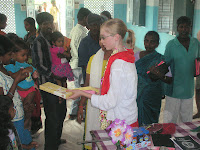I'm teaching writing this week in North Carolina and I thought I'd share a few thoughts on writing dialogue from the course I'm teaching today.
_____
Alex plopped down next to Stacy. “So, we’ve gotten together today to talk about writing effective dialogue,” he said.
Nadine nodded. “Yeah, and I’m glad. Most writer’s groups never get specific enough for me. Too much info on general stuff. I really need some nuts and bolts advice to help me with my novel.”
“Great, well then, let’s get started.”
Stacy shifted in her seat. “One of the things that bothers me the most about novice writers is the way they handle dialogue. Instead of letting each person talk naturally and in turn, they just let one person keep on talking until she’s delivered a veritable speech. Nobody else gets a chance to say anything. The man or woman--I want to be inclusive here--just keeps rambling on and on and on and that’s just not how people talk in real life! Conversations don’t work like that. No one ever gets a chance to explain everything that’s on her mind all at once without interruption.” She paused and looked around. “Right?”
“Das, right,” agreed Franklin. “Yo. Dat, or de writers jes start makin’ up der own way of spellin’ wurds rather than lettin’ somun express hisself by just his word choises. Know what I’m sayin’?”
“Yeah, it’s too hard to read when writers do that,” agreed Nadine. “Don’t you think so Moesha?”
Moesha took a bite of her cheeseburger and mumbled, “Mm, hmm.”
“Okay.” Alex looked around the restaurant table at the other five writers. “So, those are two great points. Who can summarize them for us?”
“Well,” Jason said, “let’s see… first of all, in effective dialogue, exchanges are brief. Back and forth. Good dialogue mirrors real speech because people speak in spurts rather than long lectures to each othe--”
“And sometimes people interrupt each other?” said Stacy.
“Right. And sometimes folks just let their thoughts trail off… and…” he paused to consider his response. “And clarity is essential. Dialect is best expressed through the judicious use of idiom rather than by the creative respellings of words.”
The other writers nodded in agreement while Moesha took another bit of her burger.
Focusing vs. Digressing
Stacy cleared her throat. “Well, written dialogue might mirror real speech, but it isn’t exactly like it.”
“Yo. Why do ya say dat?” asked Franklin.
“Well, sometimes in real life we just talk about trivial things--our jobs, the weather, clothes--”
“I wouldn’t say clothes are trivial,” interrupted Nadine.
Stacy smiled. “You know what I mean. Or the news, or who won the Mets game, or whatever.”
Franklin wrinkled his brow. “And so…?”
“And so, when you write, you have to use dialogue to move the story forward. Every word has to serve a purpose and not just take up space.”
“That’s a good point,” said Alex. “Writers are sometimes tempted to just put pen on paper and see where it takes ‘em. Too often, though, sections of dialogue just turn into sections of drivel. The story doesn’t move anywhere. It just stalls out. So, dialogue must always be purposive.”
Jason had been tapping his finger anxiously on the table next to his chicken wings.
Alex noticed. “Did you have something to add to that, Jason?”
“I think so.” He folded his arms and gazed toward the ceiling. “I’m not disagreeing with you or Stacy… it’s just that … well, if dialogue is too focused or too direct, it can also become too predictable for your readers. Sometimes you’ll want your dialogue to pool off in different directions. Yet, the real narrative artist can even do that in way that supports the story.”
Nadine was busy writing everything he said in her notebook. Stacy sat a little too quietly watching him.
“I don’t git it,” said Franklin. “Give me an example.”
“Well, let’s see… we’re talking about writing, right?”
Everyone nodded.
“So, let’s say we were writing this conversation down. You know, inserting it into a story or something.”
“Who’d wanna read about us?” asked Nadine.
“Just pretend. So, if we were turning this into written dialogue, we could leave out all the stuff we said when we first got here--before we ordered our food--all the small talk--”
“That’s what I was saying before,” interrupted Stacy. “That’s what I meant when I said you have to use dialogue to move the story forward.”
Jason took a deep breath. “Right, I know. I’m not arguing with you. But we’d want to include more than just the conversation. If we only included the bare bones stuff, it might tell the reader about our discussion, but it wouldn’t necessarily reveal the personality of the characters or the inner tension of the story. The readers want to see the motivations, the traits, the quirks, the uniqueness of each character. All of this can be shown by the careful use of digression.”
“Well,” Stacey said, “I don’t see how you can show all that by just a few words of dialogue.” She clinked her spoon loudly as she stirred her black coffee.
Jason sighed. “Forget it.”
“No,” said Alex. “This is good. You’re right. You brought up a good point. We can go too far to one extreme or the other. That’s what you’re saying, isn’t it, Jason?”
“Pretty much.”
Alex continued, “By digressing you can insert clues to what motivates your characters, throw red herrings to the reader--for, say, a mystery novel--foreshadow important events, or add new dramatic elements to the storyline.”
“Yeah. That’s what I was trying to say.”
Moesha nodded and wiped ketchup from her chin.






























 By God’s grace, Ariel and I spent nearly three weeks overseas and ministered to more than 1300 children’s ministers, evangelists, writers and pastors in two continents.
By God’s grace, Ariel and I spent nearly three weeks overseas and ministered to more than 1300 children’s ministers, evangelists, writers and pastors in two continents.
